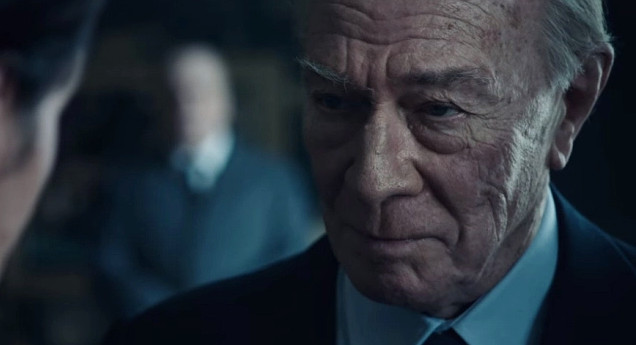All the Money in the World: a pressure-packed drama, rescued by Christopher Plummer


The plan was always for the part of J. Paul Getty in All the Money in the World to be brought to the screen with an attention-grabbing gimmick. For Kevin Spacey, the original actor slated to play the Scrooge-like, larger than life character, it was conventional: a pound of prosthetics and makeup to make him look decades older. Such feats, as a fat suit-padded Gary Oldman reminded us recently as Winston Churchill in Darkest Hour, summons the revered accolade that one is ‘virtually unrecognisable’ – a distinction audiences disproportionately associate with the actor rather than their miracle-working cosmeticians.
The deal must have felt sweetly Oscar-baiting for Spacey, before it went south: a pedigree director, legendary true crime story, and the meaty part of a love-to-hate curmudgeon, replete with emotional epoch featuring the old miser ruefully clutching a painting of the Madonna and Child, as logs poetically burn in a nearby fireplace. But when the actor’s reputation was ruined by sexual assault allegations, and the studio did not want to shelve the film due to an upcoming television series exploring similar ground, the director Ridley Scott famously decided to remove Spacey entirely.
Scott brought in Christopher Plummer (who, at 88, certainly doesn’t need enhancements to look old) as a last minute replacement. Thus a second kind of attention-grabbing gimmick, however unwanted and unintended, was initiated: a race against the clock to get the film finished in time for its original Christmas 2017 release date. Plummer shot all his scenes over nine straight days in late November, some of the key cast returned, and the director and his editor Claire Simpson burned the midnight oil.
The unprecedented move paid off, All the Money in the World arriving done and dusted as a potential player in the (almost upon us) awards season. One may be forgiven for assuming Plummer’s role is small, but in fact he is in many scenes – particularly during the film’s first half – and his performance looms over everything.
Early in the running time, on the streets of Rome circa 1973, we watch Getty’s 16-year-old grandson John Paul Getty III (Charlie Plummer – no relation to Christopher) as he is snatched by kidnappers. They demand a $17 million ransom, knowing that his grandpa is the richest man in the world. Another early, pivotal moment is a flashback depicting John Paul as a child, reading out a letter to the miser from a poor woman asking for money. Grandpa dictates a response: if I paid everybody who asked for financial support, he says, I too would be destitute.
When John Paul’s mother, Gail Harris (Michelle Williams) begins her Herculean effort to attempt to extract some coin from the old penny-pincher, Getty’s response is similar: if every one of my grandchildren were kidnapped and I paid for all of them, I would have no money. The screenplay by David Scarpa (adapting a 1995 book by John Pearson) considers lives through the prism of business transactions, building up to the predictable message, referenced in the title, about placing undue importance on wealth and possessions over matters of the heart.
Scarpa’s writing is a little on the nose, conspicuously the domain of prestige melodrama. This is a story that speaks in big messages and with absolute, moral and intellectual certainty: viewers will not be wondering afterwards whether or not they ‘got it’.
Unsurprisingly, given Scott’s multiplex sensibilities, his style prioritises pace over depth; momentum over message. As a kidnapping drama All the Money in the World is tense, curly and pressure-packed, trading in tools of suspense the veteran director can summon in his sleep – such as a dramatic moment when a key character has a gun pointed at his head, and the sound of a shot is heard when the image cuts away, putting a question mark over the moment of impact.
No single person guides the story, which allows the film a reasonably unpredictable trajectory. In this sense, the less you know about what happened in real-life the better. Some supporting characters are erratic, and their purpose in the story difficult to predict – such as the former CIA agent Fletcher Chase (Mark Wahlberg). He is initially deployed to find the abducted teenager, later to deliver old man Getty the ‘reason you suck speech’, deployed when attempts to appeal to the character’s conscience have been exhausted.
Michelle Williams’ mother-on-a-mission performance is paired in many scenes with Mark Wahlberg’s straight-shooting professional, which is an imbalance: the former clearly out-acts the latter, with a presence both hard-boiled and heartfelt. All eyes will be on Christopher Plummer, of course, who radiates high-class menace, with a deep stony glare inferring complexities and ambiguities the script doesn’t have.
At a recent Q & A, Scott interestingly described Spacey’s performance as “colder,” but said Plummer’s warmth made him “somehow more lethal.” We may never get the chance to do so, but comparing the two performances – and how they impacted the tone and tempo of the film – would make a fascinating experience.
Find times & tickets for ‘All the Money in the World’
















